新目标英语9年级Unit 5 What are the shirts made of?被动语态课件(共19张PPT)
文档属性
| 名称 | 新目标英语9年级Unit 5 What are the shirts made of?被动语态课件(共19张PPT) |  | |
| 格式 | ppt | ||
| 文件大小 | 1.4MB | ||
| 资源类型 | 教案 | ||
| 版本资源 | 人教新目标(Go for it)版 | ||
| 科目 | 英语 | ||
| 更新时间 | 2022-04-06 13:25:05 | ||
图片预览

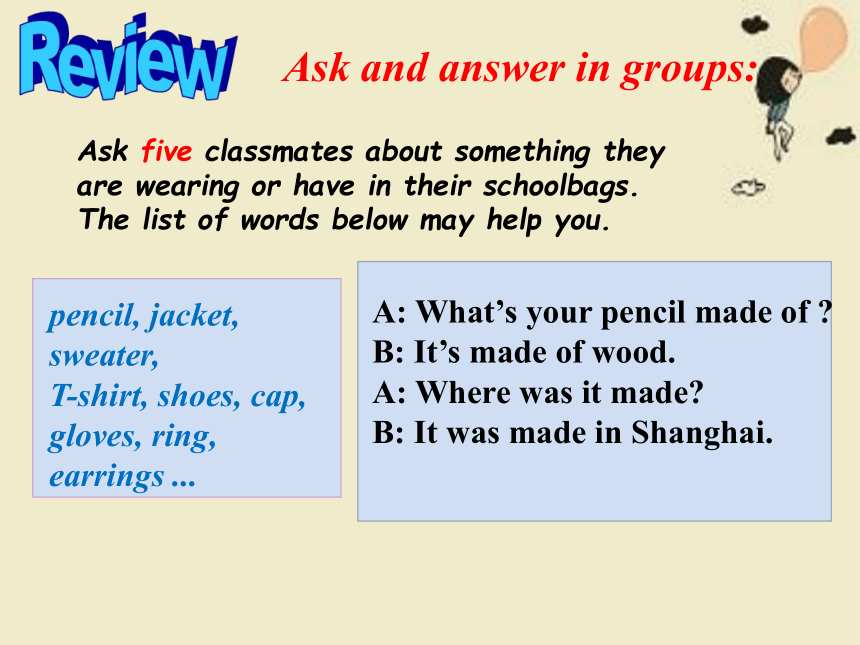
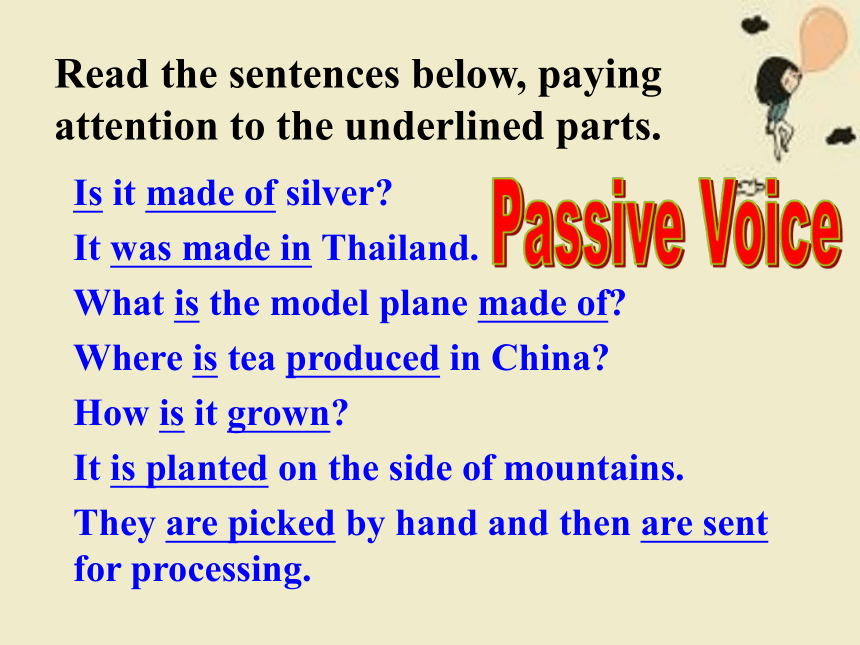
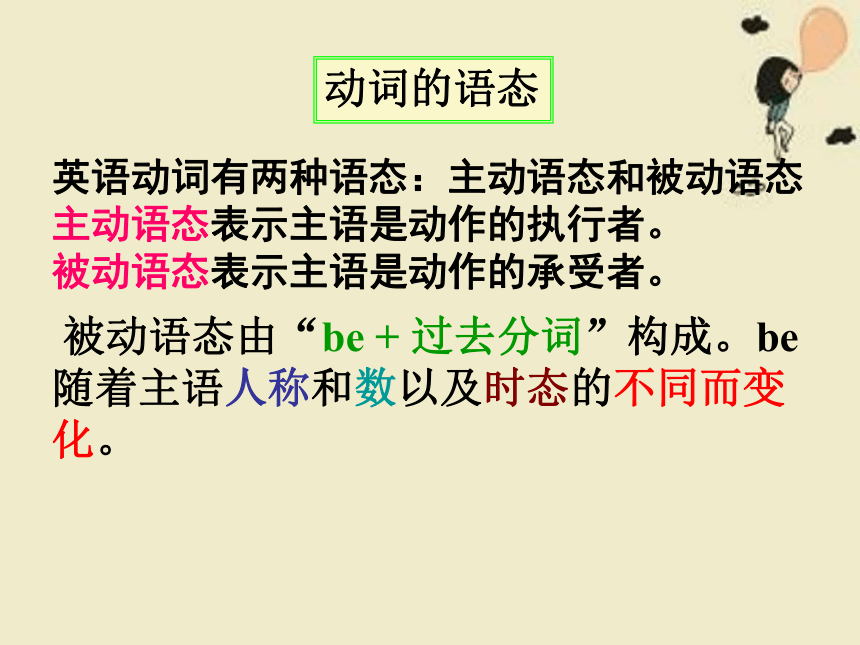
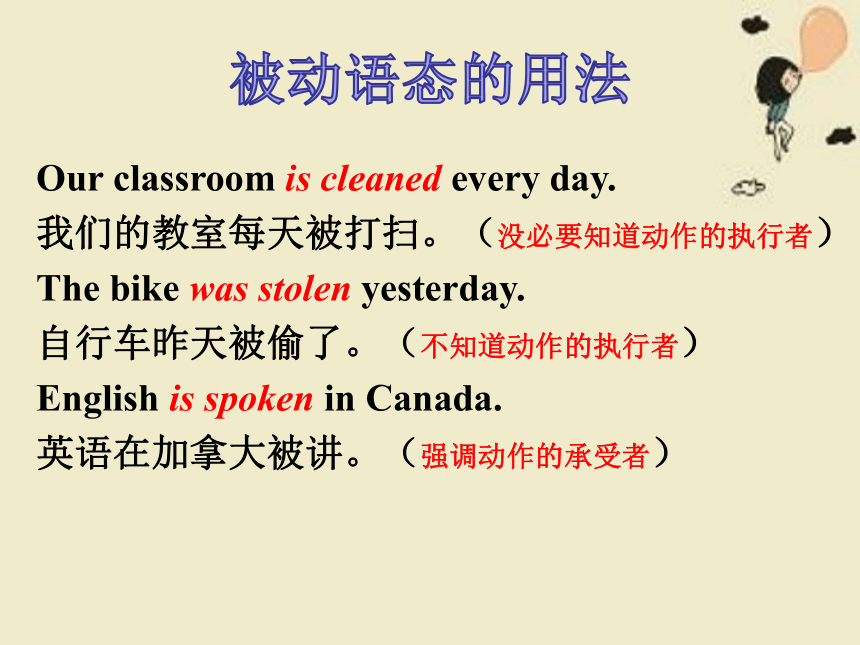
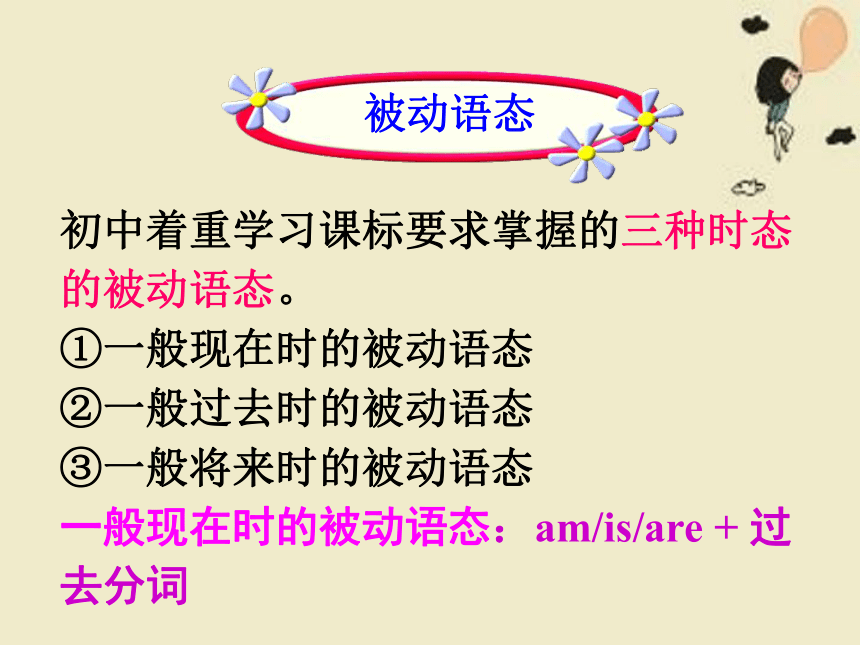
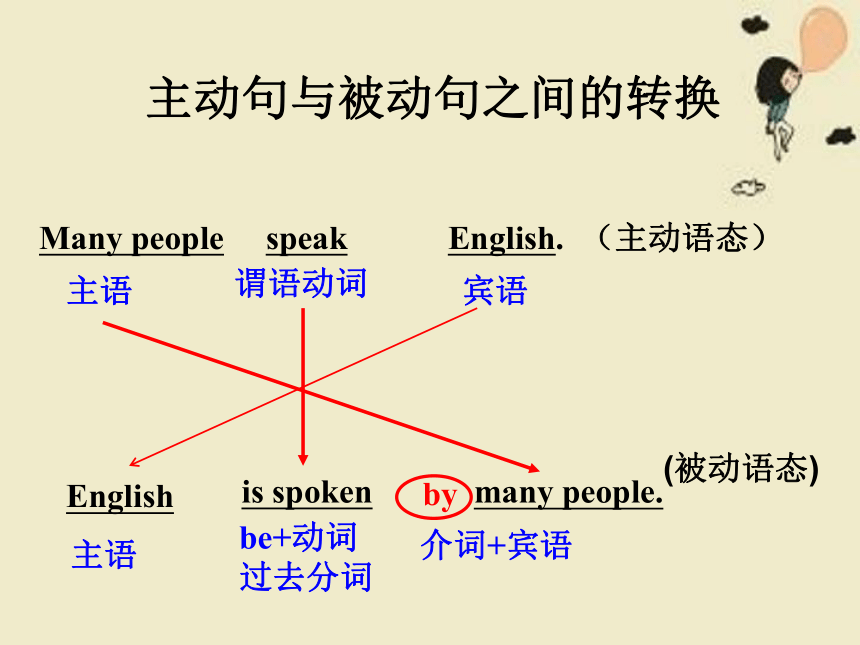
文档简介
(共19张PPT)
Section A
Period 4
Ask five classmates about something they are wearing or have in their schoolbags. The list of words below may help you.
pencil, jacket, sweater,
T-shirt, shoes, cap,
gloves, ring, earrings ...
A: What’s your pencil made of
B: It’s made of wood.
A: Where was it made
B: It was made in Shanghai.
Ask and answer in groups:
Is it made of silver
It was made in Thailand.
What is the model plane made of
Where is tea produced in China
How is it grown
It is planted on the side of mountains.
They are picked by hand and then are sent for processing.
Read the sentences below, paying attention to the underlined parts.
动词的语态
英语动词有两种语态:主动语态和被动语态
主动语态表示主语是动作的执行者。
被动语态表示主语是动作的承受者。
被动语态由“be + 过去分词”构成。be随着主语人称和数以及时态的不同而变化。
Our classroom is cleaned every day.
我们的教室每天被打扫。(没必要知道动作的执行者)
The bike was stolen yesterday.
自行车昨天被偷了。(不知道动作的执行者)
English is spoken in Canada.
英语在加拿大被讲。(强调动作的承受者)
初中着重学习课标要求掌握的三种时态的被动语态。
①一般现在时的被动语态
②一般过去时的被动语态
③一般将来时的被动语态
一般现在时的被动语态:am/is/are + 过去分词
被动语态
Many people speak English. (主动语态)
主动句与被动句之间的转换
English
主语
主语
宾语
谓语动词
by
is spoken
many people.
be+动词过去分词
介词+宾语
(被动语态)
主动句变为被动句所遵循的4个步骤:
1. 把原主动句中的宾语变为被动句的主语。
2. 把动词变为被动形式即:be+过去分词,并注意其人称和数随主语的变化,而动词的时态则保持不变。
3. 原主动句的主语如需要,则放在by后面以它的宾格
形式出现(注代词的宾格),如不需要则可省略。
4. 其它的成分(定语、状语)不变。
1) Sunglasses __________ (use) for protecting people’s eyes.
2) A picture _________ (put) up on the blackboard.
3) French ___________ (speak) in France.
are used
is put
is spoken
I.用所给动词的正确形式填空。
Group work
4) Which language _______ the most widely _______ (speak) in the world
5) The students _____ often _____ (tell) to take care of their desks and chairs.
6) Vegetables, eggs and fruits _________ (sell) in this shop.
is
spoken
are
told
are sold
People play football all over the world.
2. The old man on TV tells a story on Sunday.
3. Students listen to the kind teacher carefully.
Football is played all over the world by people.
A story is told by the old man on TV on Sunday.
The kind teacher is listened to by students carefully.
II.把下列的主动句变为被动句。
1. Children under 18 _____________ (not allowed) to watch this show without their parents.
2. We ________ (pay) by the boss on the last Friday of each month.
3. A: What language _________ (speak) in Germany
B: Most people speak German, but many can speak English, too.
are not allowed
are paid
4a Complete the sentences with the correct
forms of the verbs in brackets.
is spoken
4. Most of the earth’s surface __________ (cover) by water.
5. The classroom ___________ (clean) by the students every day.
is covered
is cleaned
被动语态的几种句型
1. 肯定句 主语 + be + 过去分词 + (by…)
A sweet song is sung by her on the stage.
2. 否定句 主语 + be + not +过去分词 + (by…)
3. 一般疑问句 Be + 主语 +过去分词 + (by…)
A sweet song isn’t sung by her on the stage.
Is a sweet song sung by her on the stage
4. 特殊疑问句 疑问词 + be + 主语 +过去分词 + (by…)
Where is a sweet song sung by her
Do you water your flowers every day (变为被动句)
Trees and flowers are planted every year. (变为疑问句)
Are your flowers watered by you every day
Are trees and flowers planted every year?
按要求改写下列句子。
3. English is spoken by the girls in class.
① 改为否定句
②改为一般疑问句,并做肯定和否定回答
③对划线提问
English is not spoken by the girls in class.
Is English spoke by the girls in class
When is English spoken by the girls
2. This shop uses the best materials to make dresses.
3. Careless driving causes many traffic accidents.
The best materials are used by this shop to make dresses.
4b Rewrite the sentences using the
passive voice.
Many traffic accidents are caused by careless driving.
4. The postman brings letters and postcards to people’s homes.
5. Our family does not use this silver plate very often.
Letters and postcards are brought to people’s homes by the postman.
This silver plate is not used very often by our family.
请将下列句子变成被动语态。
1. We use computers to search information.
2. The teacher often repeats the story.
3. They don’t allow fishing here.
4. Bill looks after his cat carefully.
5. We don’t often speak English at home.
Section A
Period 4
Ask five classmates about something they are wearing or have in their schoolbags. The list of words below may help you.
pencil, jacket, sweater,
T-shirt, shoes, cap,
gloves, ring, earrings ...
A: What’s your pencil made of
B: It’s made of wood.
A: Where was it made
B: It was made in Shanghai.
Ask and answer in groups:
Is it made of silver
It was made in Thailand.
What is the model plane made of
Where is tea produced in China
How is it grown
It is planted on the side of mountains.
They are picked by hand and then are sent for processing.
Read the sentences below, paying attention to the underlined parts.
动词的语态
英语动词有两种语态:主动语态和被动语态
主动语态表示主语是动作的执行者。
被动语态表示主语是动作的承受者。
被动语态由“be + 过去分词”构成。be随着主语人称和数以及时态的不同而变化。
Our classroom is cleaned every day.
我们的教室每天被打扫。(没必要知道动作的执行者)
The bike was stolen yesterday.
自行车昨天被偷了。(不知道动作的执行者)
English is spoken in Canada.
英语在加拿大被讲。(强调动作的承受者)
初中着重学习课标要求掌握的三种时态的被动语态。
①一般现在时的被动语态
②一般过去时的被动语态
③一般将来时的被动语态
一般现在时的被动语态:am/is/are + 过去分词
被动语态
Many people speak English. (主动语态)
主动句与被动句之间的转换
English
主语
主语
宾语
谓语动词
by
is spoken
many people.
be+动词过去分词
介词+宾语
(被动语态)
主动句变为被动句所遵循的4个步骤:
1. 把原主动句中的宾语变为被动句的主语。
2. 把动词变为被动形式即:be+过去分词,并注意其人称和数随主语的变化,而动词的时态则保持不变。
3. 原主动句的主语如需要,则放在by后面以它的宾格
形式出现(注代词的宾格),如不需要则可省略。
4. 其它的成分(定语、状语)不变。
1) Sunglasses __________ (use) for protecting people’s eyes.
2) A picture _________ (put) up on the blackboard.
3) French ___________ (speak) in France.
are used
is put
is spoken
I.用所给动词的正确形式填空。
Group work
4) Which language _______ the most widely _______ (speak) in the world
5) The students _____ often _____ (tell) to take care of their desks and chairs.
6) Vegetables, eggs and fruits _________ (sell) in this shop.
is
spoken
are
told
are sold
People play football all over the world.
2. The old man on TV tells a story on Sunday.
3. Students listen to the kind teacher carefully.
Football is played all over the world by people.
A story is told by the old man on TV on Sunday.
The kind teacher is listened to by students carefully.
II.把下列的主动句变为被动句。
1. Children under 18 _____________ (not allowed) to watch this show without their parents.
2. We ________ (pay) by the boss on the last Friday of each month.
3. A: What language _________ (speak) in Germany
B: Most people speak German, but many can speak English, too.
are not allowed
are paid
4a Complete the sentences with the correct
forms of the verbs in brackets.
is spoken
4. Most of the earth’s surface __________ (cover) by water.
5. The classroom ___________ (clean) by the students every day.
is covered
is cleaned
被动语态的几种句型
1. 肯定句 主语 + be + 过去分词 + (by…)
A sweet song is sung by her on the stage.
2. 否定句 主语 + be + not +过去分词 + (by…)
3. 一般疑问句 Be + 主语 +过去分词 + (by…)
A sweet song isn’t sung by her on the stage.
Is a sweet song sung by her on the stage
4. 特殊疑问句 疑问词 + be + 主语 +过去分词 + (by…)
Where is a sweet song sung by her
Do you water your flowers every day (变为被动句)
Trees and flowers are planted every year. (变为疑问句)
Are your flowers watered by you every day
Are trees and flowers planted every year?
按要求改写下列句子。
3. English is spoken by the girls in class.
① 改为否定句
②改为一般疑问句,并做肯定和否定回答
③对划线提问
English is not spoken by the girls in class.
Is English spoke by the girls in class
When is English spoken by the girls
2. This shop uses the best materials to make dresses.
3. Careless driving causes many traffic accidents.
The best materials are used by this shop to make dresses.
4b Rewrite the sentences using the
passive voice.
Many traffic accidents are caused by careless driving.
4. The postman brings letters and postcards to people’s homes.
5. Our family does not use this silver plate very often.
Letters and postcards are brought to people’s homes by the postman.
This silver plate is not used very often by our family.
请将下列句子变成被动语态。
1. We use computers to search information.
2. The teacher often repeats the story.
3. They don’t allow fishing here.
4. Bill looks after his cat carefully.
5. We don’t often speak English at home.
同课章节目录
- Unit 1 How can we become good learners.
- Section A
- Section B
- Unit 2 I think that mooncakes are delicious!
- Section A
- Section B
- Unit 3 Could you please tell me where the restroom
- Section A
- Section B
- Unit 4 I used to be afraid of the dark.
- Section A
- Section B
- Unit 5 What are the shirts made of?
- Section A
- Section B
- Review of Units 1-5
- Unit 6 When was it invented?
- Section A
- Section B
- Unit 7 Teenagers should be allowed to choose their
- Section A
- Section B
- Unit 8 It must belong to Carla.
- Section A
- Section B
- Unit 9 I like music that I can dance to.
- Section A
- Section B
- Unit 10 You're supposed to shake hands.
- Section A
- Section B
- Review of Units 6-10
- Unit 11 Sad movies make me cry.
- Section A
- Section B
- Unit 12 Life is full of the unexpected
- Section A
- Section B
- Unit 13 We're trying to save the earth!
- Section A
- Section B
- Unit 14 I remember meeting all of you in Grade 7.
- Section A
- Section B
- Review of Units 11-14
